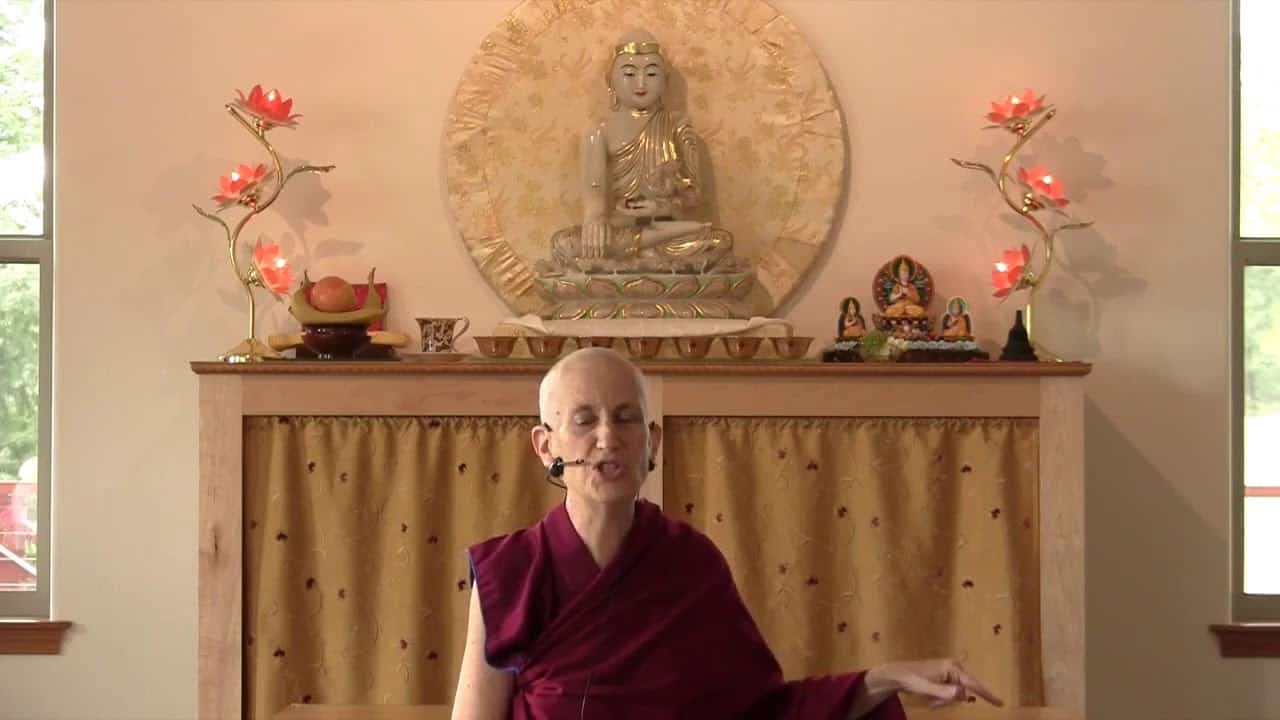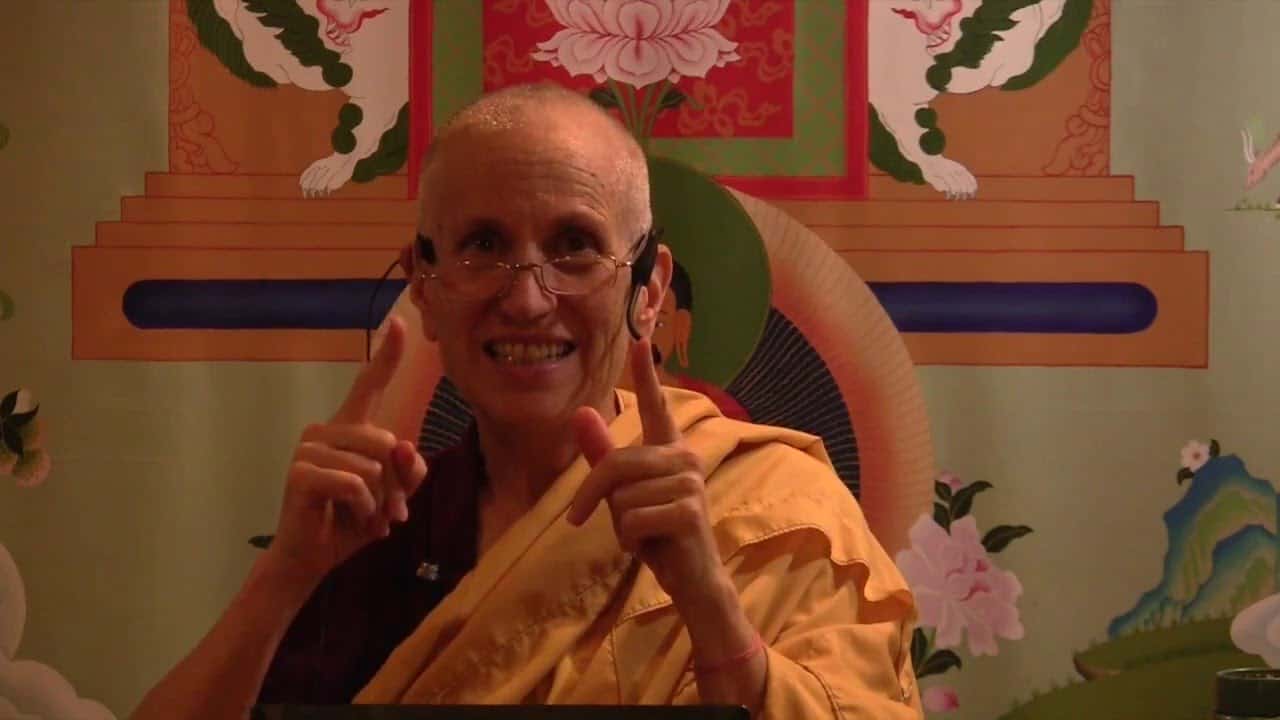What’s wrong with a little bit of pleasure?
Part of a series of teachings on a set of verses from the text Wisdom of the Kadam Masters.
- Remedies for taming the afflictions
- How attachment to pleasure is the actual problem, not pleasure itself
- The community shares examples of attachment and the problems it’s caused
Wisdom of the Kadam Masters: What’s wrong with a little bit of pleasure? (download)
To continue on line 2,
The best discipline is taming your mindstream.
We were talking before about how afflictions arise, and taming the afflictions, and so on. I thought I’d go through some of the remedies for taming the afflictions, because that could be very helpful.
Of course, wisdom realizing emptiness is the ultimate antidote to use, but since that one is more difficult, then we start with things that are easier.
Emptiness applies to all the afflictions. If you have that realization it cuts all of them, so it’s quite powerful. Whereas the ones we use now, because we haven’t realized emptiness, they’re specifically for different afflictions. They don’t cover all of them at one time.
If we start out with attachment, the antidote they always give is remembering impermanence. We really look at whatever it is we’re attached to and think how this thing doesn’t last very long, and how the pleasure we get from it doesn’t last very long.
It’s very interesting because we’re attached to something and we say to ourselves, “Oh, the pleasure doesn’t last very long, that’s true. But I want it anyway.” And then we go for it. What’s wrong with it? What’s wrong with having some pleasure? The Buddha didn’t teach that we should all suffer. He himself was an ascetic for six years and he realized that doesn’t work. He doesn’t want us to suffer. So what’s wrong with a little bit of pleasure? That’s what goes through our mind, right?
Before we can even apply the antidote of meditating on impermanence, before we can even get there, we have to answer that question: “What’s wrong with pleasure?” Well, the answer is, nothing’s wrong with pleasure. Pleasure is not a problem. What is the problem is our craving, clinging, and attachment to that pleasure. That’s what causes the problem. Don’t blame the pleasure, but look at your own life and see what happens when you get attached to that pleasure. What goes on in your mind? What do you say? What do you do to get the pleasure? And to get the object that you think gives you that pleasure? What we’re really wanting is the pleasure. But we think that the pleasure inheres in the object, so we transfer our attachment to the object, “I want that object because there’s pleasure inside of it that I can get.” Do you see what I mean? The real thing we want is the pleasure, but we put it onto the object.
There are all sorts of things here to look at. First we actually have to go back and (remember) there’s nothing wrong with pleasure, but how does attachment cause problems?
Let me hear from you: how does attachment cause problems? One person at a time, and tell me something in your life where attachment caused you a problem.
[In response to audience] You were madly in love with this boyfriend, very attached to him, pursued him at all costs, and your misery increased. And his did, too. It’s interesting how relationships are supposed to bring happiness, but they often create a lot of difficulty.
[In response to audience] Attachment to beauty, especially a garden. And then spending money you didn’t have putting all your time into it. Your friends didn’t see you. You let your Dharma practice go. Those kinds of problems came. And then the more you got involved, the more you got involved, and it became more and more grandiose and you got further and further in debt.
[In response to audience] Attachment to applause and approval. It making you do outrageous things to win the applause, to win the approval, and then those outrageous things caused problems. One of the problems is you didn’t really trust the kindness of your friends after that. You don’t trust your own value. It becomes a bottomless pit of “more, more, more, more.” Which is painful.
[In response to audience] Attachment to your hair, going bald at 21, then running around looking for all sorts of remedies, and all the emotional stress of “something’s wrong with me, and these remedies aren’t working, and what are people going to think of me if I don’t have any hair?”
That’s why he’s interested in ordaining. [laughter] It’s an interesting motivation.
[In response to audience] Falling in love at 18, you were going to marry him, and then he started shouting and screaming at you, and it went on, very verbally abusive, and he was threatening suicide, and your whole life was wrapped up in loving him dearly and not being able to leave him. A lot of pain.
[In response to audience] A lot of attachment to sleep, spending a lot of time sleeping, instead of doing other things that are constructive. And then that habit of sleep comes into when you actually do sit down because, “Okay, I’m here, what do I do? Nothing much going on.” [Fall asleep.] Really interferes with practice.
[In response to audience] Attachment to praise before leaving Australia, got lots of it, came here, we’re in silence, doing retreat, you went through withdrawal. Going through withdrawal is painful, so it got taken out on other people., because you wanted a hit of your praise. And you had forgotten that all those qualities you were being praised for came from your teachers. “They’re inherently in me, independent. I was born with them.”
[In response to audience] Attachment to romantic relationships with a lot of expectations, and then being very disappointed because those expectations weren’t met, and the pleasure that you had hoped for didn’t come about. Or it came about for a while, and then it disappeared. Again, a lot of suffering emotionally because of it.
[In response to audience] Yes, “If I can be special in one person’s eyes, then I must be worthwhile.” And it doesn’t fill the hole.
[In response to audience] A habit of looking in the past for pleasant situations and wanting to recreate them. Or having good experiences or opportunities, wanting to have those again.
[In response to audience] You waste a lot of time ruminating, daydreaming how beautiful those situations were, and they’re not coming about, and why can’t I get them? It’s unfair. The waste of time, the feeling of unfairness. Not appreciating what we do have, and bemoaning what isn’t present instead. Quite a waste of time.
[In response to audience] Attachment to driving. You like the feeling of being out alone on the road, you’re in control of the car, nobody’s there bugging you telling you what to do or where to go, but it wastes a lot of time and it wastes a lot of money, and you wind up going back to where you were when you started.
[In response to audience] Attachment to… Actually it’s attachment not just to cleanliness but attachment to your idea: “My standard of cleanliness is right,” and that brings up a lot of conflicts with people because their standard of what’s clean isn’t the same as yours. Then they don’t put things where you want them to put them, or keep things as clean as you want them to be kept, and then you get angry and then there’s personal problems. So much suffering because I use the wrong towels for the altar and the wrong towels for the kitchen. She suffers a lot because of that, even when she embroiders what the towels are supposed to be used for of the rag is supposed to be used for. It has a T so I think the T means “the floor”.(laughter) And I use it for the floor, and then she say’s, No. T means it’s for the tea counter. (laughter)
Spend some time thinking about, for yourself, how your various attachments cause you problems. You all gave one example. I’m sure there are more than one thing you’re attached to. We have to get over this obstacle in our minds of, “Well, what’s wrong with pleasure?” It’s not the pleasure. It’s the attachment.
Venerable Thubten Chodron
Venerable Chodron emphasizes the practical application of Buddha’s teachings in our daily lives and is especially skilled at explaining them in ways easily understood and practiced by Westerners. She is well known for her warm, humorous, and lucid teachings. She was ordained as a Buddhist nun in 1977 by Kyabje Ling Rinpoche in Dharamsala, India, and in 1986 she received bhikshuni (full) ordination in Taiwan. Read her full bio.


